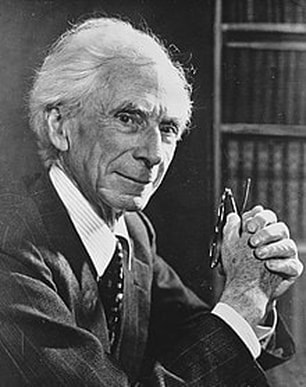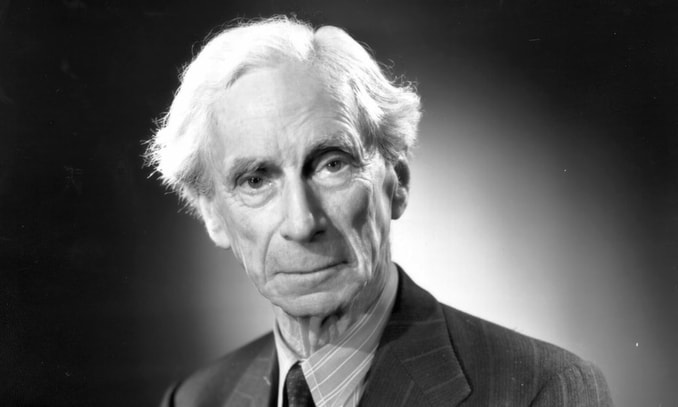2. 'General Characteristics'In this chapter Russell relates some of the impressions he got while traveling about in Russia with the British Labour Delegation. These impressions tell us a lot more about Russell than they do about Russia. He thinks the "Russian character " is attracted to certain doctrines of Marx due to its "Oriental traits." The only "traits" he mentions are those of "crushing" foes "without mercy" and maintaining a mind set "not unlike the early successors of Mohammed." Although I am at a loss trying to figure out what the Bolshevik leadership would have to share, by way of comparing mind sets, with the early followers of the Prophet. The position of Marx, which led to this observation, is his teaching that "communism is fatally predestined to come about." A position that Marx never, in fact, held. He surely thought that capitalism would collapse, but the class struggle could result in the mutual destruction of the contending classes-- which may still be on the agenda. Russell reminds us of the "kindliness and tolerance" of the English since 1688, which he contrasts to Bolshevik fanaticism and mercilessness. But of course, he says, this kindliness and tolerance "we do not apply to other nations or to subject races." This may explain why so many of the "subject races" had a greater affinity with the Bolsheviks in the years that followed than with the British. He compares the "baser side" of the Russian government with the Directoire* in France and its good side to that of the rule of Cromwell. Cromwell's Puritans are analogous to the "old Bolsheviks" led by Lenin. That is, they started out idealistic and democratic but the force of circumstance led them to become dictators over a recalcitrant population (the Russian peasants in the case of the Bolsheviks). [*The Directory was the government of France for the last 4 years of the Revolution— from1795 until it was overthrown in 1799 by the coup of Napoleon Bonaparte.] Should the Bolsheviks fall, Russell says, it will be for the same reasons the Puritans did: because people will want "amusement and ease" rather than anything else. Well, the history of Russia has never seen a time when "amusement and ease" were on the agenda, including today, so I think Russell missed the boat with these historical comparisons. Russell actually thinks there is a philosophical model, or parallel, that is more accurate than any historical one, and that is Plato's Republic. It's true that the Communist Party, the leadership at least, corresponds to the guardians and you can make a case for the CP cadre and Red Army being the auxiliaries, but Russell is completely off his rocker when he says "there is an attempt to deal with family life more or less as Plato suggested." There was no eugenics movement in Russia, the communists did not have a rigged lottery system to distribute sexual partners, handicapped and illegitimate children were not put to death ("exposed"), marriage was not outlawed until retirement. At most you have an effort to bring about equality between the sexes and provide universal education. The demands of the Communist Manifesto as well as Plato. So the assertion that there is an "extraordinary exact" parallel between Plato and what Lenin and the Bolsheviks like him envisioned is wide of the mark. Russell doesn't think war and revolution (violence) will bring forth the best models of socialism, and for this reason he rejects the Third International which he perceives as an instrument to promote a violent international class war. The 1920 Congress of the Third International did pass resolutions based on the mistaken theory that world wide civil war was about to break out between the exploited masses and their rulers (even in the US) and that communists had to be ready for the test of arms. Needless to say, nothing of the sort happened (at least on the scale imagined) as the post W.W.I revolutionary wave petered out. So Russell had a more realistic position than the Bolsheviks on this issue. He also objected to the theory of "democratic centralism" (referred to by him as "concentration of power." This theory was developed to provide effective leadership for worker's parties in conditions of illegality and/ or war. Many socialists do not think it is suited for times of peace and legality under functioning bourgeois democracies. Russell didn't approve of it, although he does not mention it by name he is dealing with the concept, because, he says, "from concentration of power the very same evils flow as from the capitalist concentration of wealth." Russell talked with Lenin and remarked, in this chapter, that Lenin was a true internationalist, as are all communists, and would have sacrificed power in Russia to help the international revolution. With the failure of the world revolution Russell imagined that nationalism would begin to take root in Russia. He also met Trotsky, at that time the leader of the Red Army, and remarked on the enthusiasm he aroused in public. Russell thinks that when the Asiatic parts Russia are retaken (as the Civil War comes to an end along with foreign occupation: the USSR was not founded until 1922) the communists will act like typical imperialists (they didn't) and behave like other Asiatic governments "for example, our own government in India." Coming up: Chapter Three-- "Lenin, Trotsky and Gorky" AuthorThomas Riggins is a retired philosophy teacher (NYU, The New School of Social Research, among others) who received a PhD from the CUNY Graduate Center (1983). He has been active in the civil rights and peace movements since the 1960s when he was chairman of the Young People's Socialist League at Florida State University and also worked for CORE in voter registration in north Florida (Leon County). He has written for many online publications such as People's World and Political Affairs where he was an associate editor. He also served on the board of the Bertrand Russell Society and was president of the Corliss Lamont chapter in New York City of the American Humanist Association.
0 Comments
Leave a Reply. |
Details
Archives
May 2022
Categories |


 RSS Feed
RSS Feed